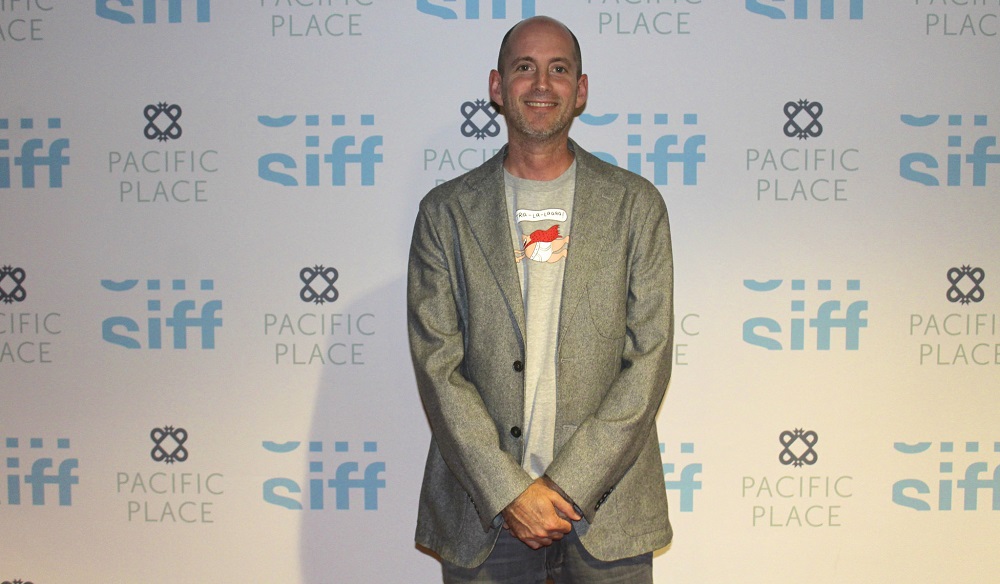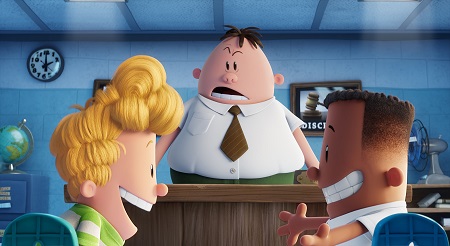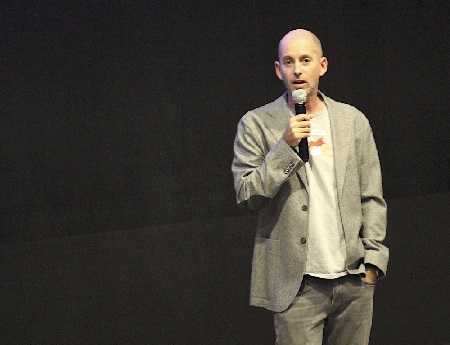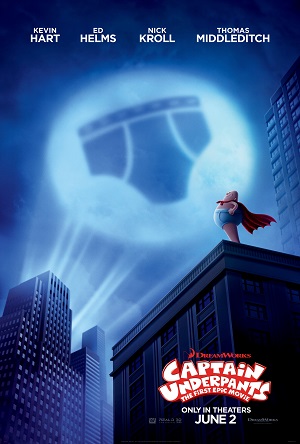
“Captain Underpants: The First Epic Adventure” – Interview with David Soren
by Sara Michelle Fetters - June 16th, 2017 - Film Festivals Interviews
a SIFF 2017 interview
The Secret Ingredient is Friendship
David Soren Chats About Bringing Captain Underpants to Life
I honestly didn’t know what to expect from DreamWorks latest animated endeavor, Captain Underpants: The First Epic Movie. While I was familiar with author Dav Pilkey’s series of best-selling books, the initial trailer and ads for this piece of pop, family-friendly entertainment weren’t exactly awesome. They didn’t exactly make me feel as if this first cinematic adventure of mischievous Jerome Horwitz Elementary School fourth graders George Beard (voiced by Kevin Hart) and Harold Hutchins (Thomas Middleditch) was going to be anything special, and as such my excitement to see it was significantly less than it otherwise should have been.
But apparently I shouldn’t have been worried, especially with The Muppets and Neighbors impresario Nicholas Stoller writing the script and Turbo director David Soren confidently guiding things. They do a splendid job of giving Pilkey’s characters and world visual life, crafting a surreal, craftily childish comedy that’s far more intelligent, and a heck of a lot more endearing, than I was initially anticipating.
Playing as a featured attraction during this year’s Seattle International Film Festival, Soren actually came to town to introduce his sophomore feature to what he hoped would be an appreciative crowd. Sitting down to speak with him about that just the morning after this screening, his energy and enthusiasm over the experience was palpable to say the least, as was his eager desire to discuss what was required to bring George and Harold’s adventures to the movie going public. Here are some of the highlights from our conversation:
Sara Michelle Fetters: How much time was there between when you finished working on Turbo and getting that released in 2013 that you jumped into Captain Underpants?
David Soren: I didn’t get approached about this one until about a little over two years ago. After Turbo I started developing another original idea and got a couple of drafts through that one, but then [DreamWorks] was making some changes and they asked me if I wanted to think about doing Captain Underpants while that was happening. I said I didn’t even need to think about it. It sounded awesome. I love this book. I’ve been a fan of it for years.
Sara Michelle Fetters: You read my mind. I was going to ask you about your familiarity with Dav Pilkey’s books next.
David Soren: [laughs] I’m psychic.
No, seriously, I was absolutely familiar with them. I mean twenty years ago I just moved to LA and I found myself in a bookstore, saw the very first epic adventure of Captain Underpants on the shelf and I picked it up on a whim. I thought this is really silly looking and just started reading through it and, before I knew it, I was halfway through the book right there in the aisle of the bookstore! I stood there kind of wishing I’d come up with the idea myself. I was so smitten.
Years later I had kids, I’ve got a ten-year old-and a seven-year-old, so I got to introduce them to the books. We read them together and we were in hysterics. And all of that happened long before the studio acquired the rights to them! So, yeah, by the time they talked to me about it, I really was kind of a huge fan and was very excited to be a part of this.
Sara Michelle Fetters: What is about Dav Pilkey’s books that makes them so memorable?
David Soren: Well, I think it starts with a really sticky premise, you know, of these two kids who hypnotize their terrible principal and turn him into their comic book creation. And it’s really kind of classic wish fulfillment type stuff. That, whether you’re a kid or whether you’re somebody remembering their childhood, it’s really appalling but also it’s hilarious, this idea. They’ve turned their principal into an underpants wearing buffoon who runs around the city pretending to fight crime. There’s a lot of goofy goodness there.
Sara Michelle Fetters: What was it like, though, for you and screenwriter Nicholas Stoller as you attempted to come up with a script? What were the challenges?
David Soren: I think we started with mining elements from the first four books because there wasn’t enough meat on the bone with any one book in particular. The first book has sort of an origin story aspect to it, how [Principal Krupp] gets hypnotized and becomes Captain Underpants. Then there’s the villain that we loved the best, Professor Poopypants, who is from the fourth book and so we took aspects of his story from that. There are other things in the movie from some of the other books, too.
That was the first thing, sort of going through this checklist of things that we wanted the first movie to be made up of and then creating a story around those components. When I came on Dav Pilkey and I met up about a month in and I walked him through some of the changes that we were making to the story and I showed him a bunch of the artwork that our crew had done. And he really felt at ease. I was trying to assure him that we were trying to capture the spirit of what he was doing, and I think he could see that and he could feel it. In the best possible way, he gave us creative freedom and trusted us, but he also said something that was incredibly generous, which was that he really doesn’t like adaptations that are just page for page true to the source material, because it is always like, what’s new? What are you bringing new to the table? He felt that was just boring and that people might as well just read the book. Who needs to go see the movie? So he really wanted to be surprised and as a result, he empowered us to make the best version of a Captain Underpants movie that we possibly could.
Sara Michelle Fetters: I think the film works, not because of all the silly stuff, not because of all the absurdities, not because of a giant robotic toilet or a guy named Poopypants, but because of the friendship between Harold and George.
David Soren: I think it’s the secret ingredient that makes the books work, too. I mean, there’s twelve of them in the series. There’s so much wackiness, so much absurd plot, but really the thing that keeps people loving those books as much as they have over the past twenty years is that friendship between George and Harold.
The thing about it for me that rings true, and I think where I could kind of access it on a personal level, was that it’s a creative friendship, a creative partnership. One’s the writer, the other’s the artist. They make these comics together. They tell stories together. All my favorite relationships I’ve ever had, the friends I treasure the most in my life, have been creative in nature. I just love the idea of being able to kind of bring that kind of relationship to the screen. See two kids just working, brainstorming, even though their sense of humor is absurd. What allows all the absurdity in the movie to happen is that it is coming out of the imaginations of these two fourth graders.
Sara Michelle Fetters: And, as part of that, while we don’t really have any idea how the two are doing in school…
David Soren: Good students or not. They’re grades.
Sara Michelle Fetters: Right. And it’s really not all that important if we know that or not.
David Soren: You’re right. It isn’t.
Sara Michelle Fetters: Yet, it’s also never in doubt that these are two intelligent youngsters. They just might be using their intelligence in a different way.
David Soren: Right. And I think that’s a great message to send out to youngsters. Absolutely. In this day and age where there are massive cuts to music and art programs, and where creativity in schools is so undervalued, there are a lot of kids out there who could really benefit from being encouraged in those areas. Not just as fun time, but as a better way of learning and having information sink in.
Obviously in our case George and Harold are dealing with a terrible principal whose closed down the music and arts program so he can put an electronic door opener in his office. So they see themselves as these kind of Robin Hood figures who are trying to do this noble thing, making sure that there is fun and that school is a good place to be. They don’t have a bone to pick with school; they just have a bone to pick with the guy running it.
Sara Michelle Fetters: So much has changed as far as it comes to family films. The movies that were coming out in the 1980’s were about fourth graders or kids, elementary school kids are very different from a humor aspect than what you can probably get away with now. Do you find that that’s a difficult line to navigate? Do you think to yourself maybe a certain joke is no longer appropriate? That maybe times have changed and you can’t throw certain gags into the mix?
David Soren: I think that’s right. And we do think about it. I mean we actually looked at a lot of John Hughes movies for inspiration, like Ferris Bueller’s Day Off and Weird Science. John Hughes had this great knack for making comedies likes this. Both of those movies have great friendships at the center of them. He seemed to be able to tap into the voice of a generation. They’re very funny, all of his movies, but they are also poignant and they actually have meaningful things to say, which I think is why they have stood the test of time. So there’s timelessness to his work that we were attempting to go for with this.
Look, there is no question that even in the twenty years Dav Pilkey has been writing these books, there are certain sensitivities that have crept into the culture that we definitely had to think about. Things like bullying. Things like laughing at somebody’s name. Things like that, there is no way to not address those things. We screen these movies regularly and we would constantly get feedback. We would look at where that line was and occasionally we would cross it, so we’d learn where we needed to try and pull back or find a different way to say something so that it wasn’t insulting.
Sara Michelle Fetters: It has got to be something that is difficult, especially in regards to family-friendly animated films. Navigating this line now, you can’t please everybody.
David Soren: No, you can’t. You certainly can’t. I’m not sure you ever could. But, obviously with online and the feedback that is instant out there, you just really can’t ever expect to please everybody. And I think one of the liberating things about this project was that the books, as beloved as they are, they also come with a certain amount of controversy. Now whether you agree with that controversy or not, and personally I don’t, it allowed us to recognize a lot of this is out there already.
People who don’t like the books, they are entitled to their opinion. They also may not like the movie, and that’s fine. We are not going to go chase after those people. There are 80-million people who do love the books and treasure them, and those are the people we care about. So it was liberating, because often you are chasing every common demographic you can. And that ends up often watering down the movies significantly. So it was nice to just purely make the best version of a Captain Underpants movie we could without betraying the material and staying to true to all the things that make the series of books what they are.
Sara Michelle Fetters: In regards to working with DreamWorks Animation, I don’t think a lot of people are going to know this, but you’ve basically been there since the beginning. Since The Road to El Dorado.
David Soren: Yeah. It’s been twenty years now. Crazy.
Sara Michelle Fetters: What has that journey been like? Also, just looking at the state of animated film as a whole, what has changed just in that time period?
David Soren: Yeah. It’s amazing. There have been so many movements within the past twenty years. When I started there was a real stigma about CG [animation] not being welcomed yet. There was a snobbiness about hand drawn animation, a feeling that it was the best way to go. There was also this thing happening with cartoony movies where the stories were getting more realistic and more like live action movies, and so then it was like, well, why are we drawing them in the first place? Then movies like Toy Story and Shrek came along, animated films that were fun and playful and silly, ones that reminded people why animation was fun to begin with.
So, certain things have happened over the course of these twenty years. It’s been great, though, to weather all that and now be at a point where the technology is such that you can do anything you want. And it really comes down to taste and choice. What those films are that you want to make, and how you want them to look.
Sara Michelle Fetters: Speaking about doing anything you want, your movie epitomizes that sort of philosophy, doesn’t it? You’ve got sock puppets, hand drawn animation, and computer animation.
David Soren: That’s right. The movie became like a real celebration of animation for us. I was ready to go back and revisit a lot of classical stuff, but to do it in a cartoony way. The boys can do almost anything they want. Their imagination is such that if they pick up a pair of socks and want to tell a story with socks…then they tell that story with socks.
Sara Michelle Fetters: At the end of the day, what do you hope people take away from this film? What do you think they’ll be talking about when they leave the theater?
David Soren: I hope they come in, not unlike you did, where there may be a certain expectation, but the actual movie blows them away and surprises them. Sure there is potty humor, of course there is, but we all secretly have to admit sometimes potty humor is funny. But beyond that, the movie is actually subversive, it’s smart and it’s got some real poignant things to say, even if they are often being said with a wink. That stuff, the friendship, the celebration of creativity, those are my favorite aspects of the movie. I want people to feel the same.
– Interview reprinted courtesy of the SGN in Seattle







